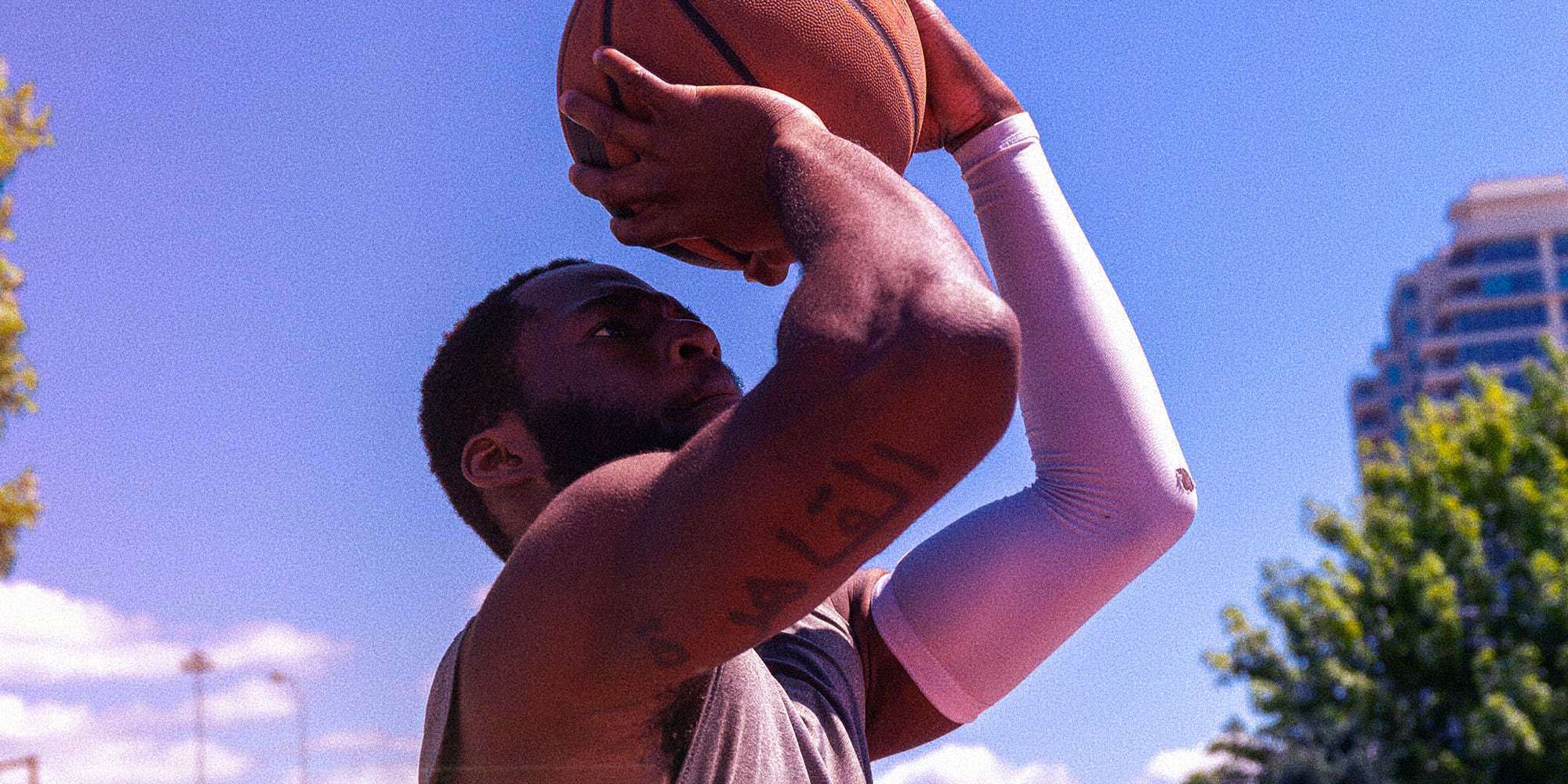Ever since Allen Iverson donned his arm sleeve at the turn of the millennium, there’s been an increasing number of players wearing arm sleeves during NBA games. By arm sleeves, we mean those nylon or spandex ‘tights’ for your arm that extend from the bicep all the way down to the wrist.
Now, Iverson initially wore it because he suffered from bursitis, which is inflammation of the cushioning bursa between bones. But even after recovery, he continued to wear an arm sleeve on his shooting hand.
Now no one can be certain of why Allen Iverson took a liking to his basketball arm sleeve, but many people speculate that it was a bit of a fashion statement. At the time, it certainly did give him that unique look on the court, but with so many pro basketball players wearing them these days, there must also be other reasons for doing so.
7 Reasons Why Players Wear Arm Sleeves
So from our research, we’ve come up with the 7 possible reasons players wear an arm sleeve (or two) when they play ball.
1. To keep the shooting arm warm
Everyone in athletics stresses the importance of being properly warmed up. Not only does it reduce the risk of injury, but muscles also function better when they’re properly warmed up. Movements in the arm will be flexible and smooth — especially important for precise shooting motion. You don’t want a stiff arm as you follow through with your shot.
Wearing arm sleeves warms up your arm and increases blood flow to the area, so on paper they sound quite helpful. Of course, there is a lot of debate about how much difference basketball arm sleeves actually make, because players warm up before play and usually stay warm as they hustle around the court.
2. Protection
When you’re playing on a small court crowded with giants, there will inevitably be a lot of contact. Defenders might swipe your arm in a scramble, or you might burn your arm as you you’re thrown across the hardwood surface.
These nylon or spandex sleeves provide extra protection against scratches, cuts, bruises and sprains. They sometimes have extra elbow padding which will protect the player from impact when they hit the ground and reduce the severity of any injury.
3. Compression
Injuries are a part of any sport. Compression is a new-age therapy with roots in science. It works by applying pressure to surface veins and forcing blood back into the deep vein system.
The actual science is more complex than you think, but the takeaway is that compression sleeves really can aid in the recovery of common sporting injuries like tendonitis in the elbow joint (a.k.a. shooter’s elbow/tennis elbow/golfer’s elbow).
Players with severe injury should be sidelined, but if it’s just a little swelling or muscle soreness, wearing compression arm sleeves can be helpful.
4. To keep the sweat out
In some cases, it’s not as complicated. Some basketball players who play defense like to wear the sleeve because it keeps the sweat on their arms under control. When a player has sweat dripping down their arms, it can be difficult to grip the ball.
Among other things, this affects their ability to shoot the ball accurately or palm the ball. Some sleeves are specifically made to absorb sweat which is especially helpful for players who perspire excessively.
5. Appearance
Sometimes basketball sleeves aren’t functional but just come down to looks. NBA players are often fashion icons off the court, so it’s no surprise they might want to show some extra swagger on the court. In fact, compression sleeves are the most popular accessory outside essential apparel among basketball players.
6. Placebo
Some players believe that it makes them perform better, perhaps because it is said that sleeves possess functionally beneficial properties. A placebo effect, if you will. This is why basketball players usually wear arm sleeves on their shooting arm, and not the other.
7. Covering up Tattoos
Many NBA players sport tattoos, and it’s not against NBA rules to have them unless they display logos or promotional commercial content. But there are cases when a player would prefer not to have his tattoos on display. One such example is Carmelo Anthony, who wears sleeves on both arms to cover some pretty embarrassing tattoos he acquired when he was a Denver Nugget.
Possible Problems with Arm Sleeves
Clearly, there appears to be a lot of reasons to wear a sleeve or two. Some reasons down to function, others for form. But like most things, there are potential downsides to these arm sleeves too, especially for players with specific medical conditions. Let’s take a look.
Allergies
If a player is allergic to nylon or spandex, the fabric could lead to a reaction that basically renders them unusable because they’ll be uncomfortable all game.
Medical complications
I’m not going to pretend to be a doctor here, but misuse of compression garments does carry potential side-effects which include worsening ischemia (restricted oxygenated blood flow), peripheral nerve damage, and breaking the skin.
Movement restriction
If there were all the aforementioned benefits (however minor) to wearing sleeves, the question would be why wouldn’t you wear them? Well, from a personal perspective, I definitely prefer the feeling of not wearing one. Maybe I just need to wear sleeves more often, but I don’t like the little bit of extra tension they add to my arm. No doubt, many players will also prefer just playing without a sleeve.
Parting Thoughts
Overall it seems basketball sleeves have some functional benefits, but nothing significant to wear them all year round. If the team’s doctor has advised the player to wear them, then the player obviously should follow the advice. But we’re going to go ahead and guess that players like Lebron James and Dwight Howard don’t wear them purely for function, there’s got to be a style thing going on, too.

